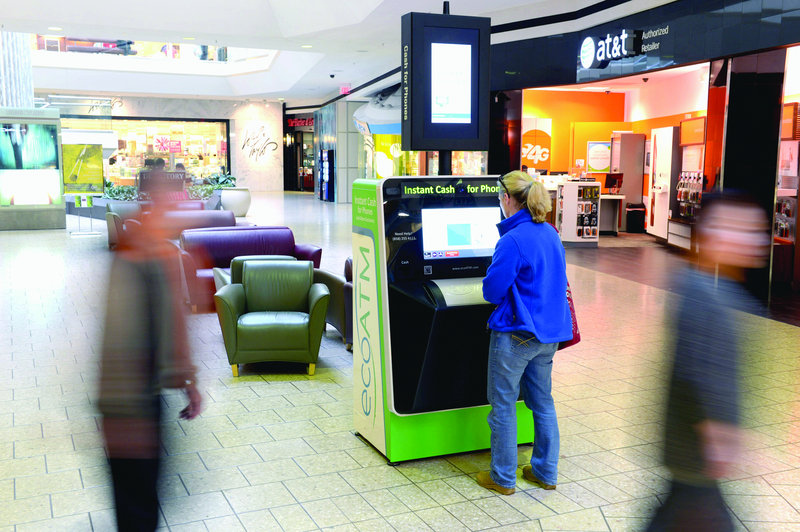WASHINGTON – Here’s an easy way to get some cash: Drop a used smartphone in any of the 13 ATM-like kiosks at shopping malls around the Washington region and, within minutes, the machine will spit out as much as a few hundred dollars.
The process is so simple that local police fear these ecoATMs are fueling one of the nation’s most pervasive criminal trends — cellphone theft.
The kiosks have become a particular thorn for police in Washington, where 40 percent of all forced robberies last year involved a cellphone, the highest percentage in the nation.
In a recent investigation, Washington police found six cellphones stolen from city residents in ecoATMs located in the suburbs. Police in Arlington, Va., say they are investigating whether stolen phones have made it into an ecoATM at a shopping mall near Washington. Authorities shut the machine down this month, citing a lack of a proper merchant license.
“This is a huge problem. The opportunity for quick cash is driving robberies of smartphones,” said Gwendolyn Crump, a spokeswoman for Washington police.
The stolen smartphone market is thriving largely due to an unregulated trade that spans the globe, authorities say. Used Apple devices are in strong demand overseas, where an iPhone 5 can sell for $500 or more. (It costs as little as $200 in the United States because it is subsidized by cellular carriers.)
Sales of used smartphones are expected to reach $5 billion by 2015, according to Gazelle, a Boston firm that offers money for smartphones online. The company expects revenues of $100 million this year.
EcoATM and other similar firms say they are being unfairly blamed for phone thefts. The companies said they scan the unique IDs of the cellphones they acquire and check them against police databases that list stolen phones.
Matches are extremely rare, they say. But those databases aren’t always comprehensive. So a report about a stolen phone in Washington won’t necessarily be included in the database run by police in the Maryland and Virginia suburbs, said ecoATM, which operates about 340 kiosks across the country.
“We are disheartened by the focus on us because we are hoping to provide transparency on our reporting, and we want to help the D.C. police come up with solutions to catch thieves,” said Ryan Kuder, ecoATM’s director of marketing.
Smartphones have become the target of too many violent robberies, police say. In the summer of 2011, a Washington father was brutally beaten with a baseball bat for his iPhone and suffered permanent brain damage. Local police last year set up fencing operations that recovered nearly 500 stolen phones from stores and individual dealers. Law enforcement officials in Los Angeles and Atlanta have also singled out ecoATMs, saying the promises of “instant cash for phones” may be encouraging thieves.
An ecoATM can operate without a human being. The kiosk automatically scans a person’s ID, snaps a picture of the customer and takes a fingerprint. It then automatically checks the unique phone ID against a local police database, which is updated regularly. If the ID isn’t on the list, the machine instantly dispenses cash to the user.
There are no limits on the number of phones an individual can deposit. Washington Council member Tommy Wells, D, said police have seen individuals hand off phones to third parties who make the transactions at ecoATMs. In one police video, an elderly woman appeared to act as a middleman and deposited a stack of boxes of phones into a local ecoATM, Wells’ staff said.
Send questions/comments to the editors.



Success. Please wait for the page to reload. If the page does not reload within 5 seconds, please refresh the page.
Enter your email and password to access comments.
Hi, to comment on stories you must . This profile is in addition to your subscription and website login.
Already have a commenting profile? .
Invalid username/password.
Please check your email to confirm and complete your registration.
Only subscribers are eligible to post comments. Please subscribe or login first for digital access. Here’s why.
Use the form below to reset your password. When you've submitted your account email, we will send an email with a reset code.